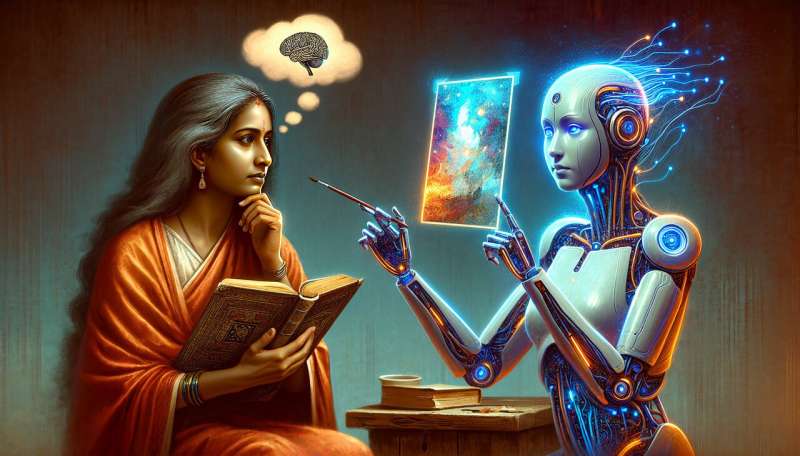This article has been reviewed according to Science X's editorial process and policies. Editors have highlighted the following attributes while ensuring the content's credibility:
fact-checked
trusted source
proofread
Will AI take over human creativity? Philosopher offers insights

The steady drumbeat of triumphant claims from artificial intelligence companies can be overwhelming. If AI models are so smart, is there anything left for humans to excel in?
Lindsay Brainard, Ph.D., assistant professor in the University of Alabama at Birmingham's Department of Philosophy, researches the philosophy of creativity, and with new claims of increased creativity and collaboration of new AI models, she is exploring what the future of human creativity looks like.
In her first paper, titled "The Curious Case of Uncurious Creation," which was published in the journal Inquiry in September 2023, Brainard attempted to assess whether these new AI models really are creative.
"That depends on how you define 'creative,'" Brainard said. "Is it the ability to generate things that are new and have value? If yes, ChatGPT could qualify.
However, she argues that an important aspect of creativity is curiosity, which is missing from the current AI models. Considering that, human creativity is safe for now, she says.
"I consider the question of whether these AI models stand to make human creativity in the arts and sciences obsolete, despite not being creative themselves," Brainard wrote in the abstract of her Inquiry paper. "I argue, optimistically, that this is unlikely. I'm not saying it is impossible, just that today's models do not meet the conditions for creativity."
In her second paper on creativity and AI, Brainard raises the question, "Should we still be striving to make our students, or our children, creative?" and will be exploring this topic in depth in her third paper.
"We are faced with a dilemma: We must either concede that AI can make human creativity obsolete or identify some value of human creativity that AI does not appear capable of achieving," Brainard said.
Given the latest developments in AI and students' interests, Brainard and colleague Joshua May, Ph.D., philosophy professor at UAB, are committed to conducting modern, up-to-date philosophical investigations about critical topics. They are currently developing a class on the ethics of AI that they hope to debut in spring 2025.
With Brainard's exploration so far, her answer for whether AI offers a substitute human creativity is "no."
"In my next paper, I will argue that there are at least four respects in which human creativity is valuable that cannot in principle be achieved by contemporary AI or its nearby descendants," Brainard said. "AI has yet to achieve originality, a particular form of self-cultivation, connectedness and imagination."
More information: Lindsay Brainard, The curious case of uncurious creation, Inquiry (2023). DOI: 10.1080/0020174X.2023.2261503


















